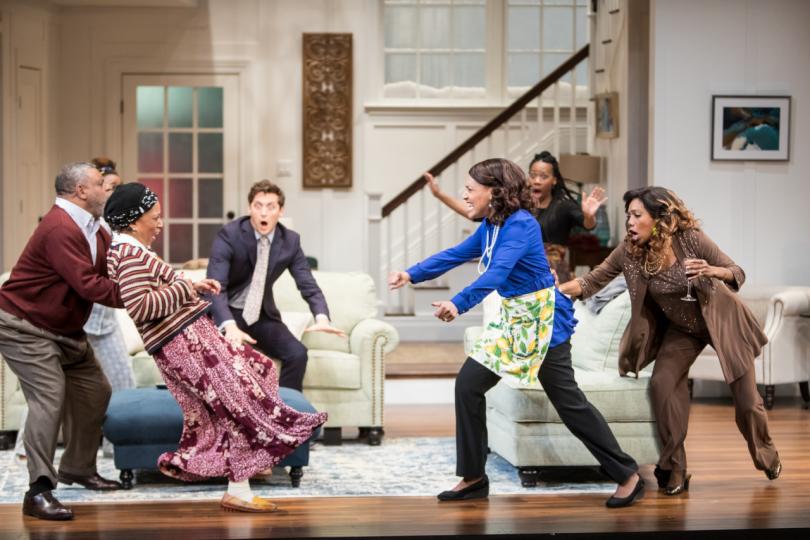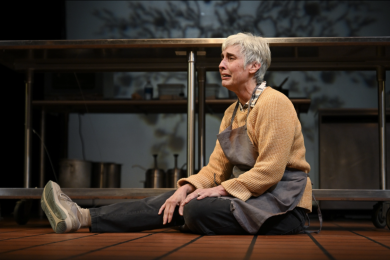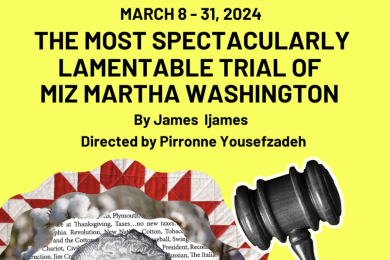Physicality and Language

Familiar, written by the all-around bad ass Danai Gurira (no really, just look at her impressive CV with acting, writing, and her amazing global work!), is striking in its familiarity -- at its heart, it is a family piece, with many complex relationships, alliances, agreements, and compounded secrets providing fodder for the action on stage. What (perhaps) isn’t as familiar in a western theatrical context are the faces, language, and struggles faced by its characters. Drawing on her own experiences, Gurira has shaped a poingenet, heartfelt story that is humorous enough to avoid slipping into saccharine sentimentality. By keeping the characterizations just a bit broader, and the staging quite commedic and big, director Taibi Magar encourages us to laugh and feel along with this family. Familiar keenly reminded me of my own family, all while centering around the many specifics that we are typically not exposed to on the stage.
Familiar opens on the well-appointed, upper-middle class home of Dr. Marvelous Chinyamurindi (Perri Gaffney) and her husband Donald Chinyaramwira (Harvy Blanks). Immigrants from Zimbabwe, they have built a very successful life for themselves in Minnesota -- she is a biochemist and he is a lawyer. They excitedly get ready for the marriage of their eldest daughter, the high achieving Tendi (Shá Cage), to the very polite and internationally-minded Chris (Quinn Franzen). The comedy and heartache come about while trying to mesh Marvelous’ ideals of midwestern conformity to the values and traditions of her family, in particular Marvelous’ sisters, Anne Mwarimba (Wandachristine) and Professor Margaret Munyewa (Austene Van), and her youngest child, the free-spirited younger-daughter Nyasha (Aishé Keita), recently back from a trip to Zimbabwe. Despite Marvelous’ dictate that Chris’ family will find them “classy, civilized and modern,” Chris and Tendi ask for a Roora ceremony (a traditional bride price ceremony), which Anne is only too happy to perform (aided by Chris’ impossibly midwestern brother Brad (Michael Wieser)). Boisterous and compelling, Anne pushes Marvelous to remember Zimbabwe and reconnect with her own heritage and parts of her past she had wanted to forget.
What struck me the most is how often I have seen similar stories to this -- family dramas and weddings are our Ur human stories -- but I have never seen one about a family quite like this. The squabiling sets of sisters (Marvelous/Margaret/Anne and Tendi/Nyasha, respectively) would be equally at home in most family comedies or dramas. Indeed, Adam Rigg’s set has an almost sitcomy feel to it. All the white painted wood, dark hardwoods, and demonstratively upper-middle class furnishings (right down to some mass-produced “fine art”) are highly evocative. This set reminds you that future playwrights will use the 21st century as a backdrop because it will be able to cannote certain things about America, the West, and our contemporary culture.
Perhaps what I was least expecting, but came as a joyous surprise, was the intense physical comedy married to realistic language brought together by the Guthrie’s staging. This is a very physically comedic play. Most of the young lover scenes (Tendi/Chris and to a lesser extent Nyasha and Brad) are over-the-top in an eye-rolling, skirt-hiking, moony-eyes way. Even the mannerisms adopted by some of the other characters (such as Anne’s tea-sipping and pillow striding, Brad’s over-gesticulating arms, and everyone’s reaction to Donald’s apparently repulsive liquor) are played up for laughs. When the family piles onto the large ottoman to watch a particularly exciting bit of American football, they sway back and forth like a boat at sea. They are not afraid to take up and truly inhabit the space, and that in and of itself feels meaningful.
The only person who does not start off this way is Cage’s Tendi. Tendi is icy and haughty, bossing around her sister and attempting to constrain her aunts. Tightly controlled by her mother, when she finally loses composure she is large and dominiting on the stage. While chasing Chris, there is a physicality between them that is quite equalizing -- she feels as big as him, and moves better than him. It is an admittedly funny scene, but Cage and Franzen manage to strike a nice balance between broad humor while respecting the underlying insecurity and unhappiness Tendi feels at that moment.
Keita and Wieser have a bit less to do (in particular, some of Keita’s earliest lines are a bit trite and on the nose, and Wieser’s character is demonstratively not the point of the piece) but both understand their place in the script, and call attention to themselves at just the right time. They too are gregariously physical, and the end of Act 1 is hysterical. During their moments of private conversation, you start to see the people they will become.
Into this raucous physicality enters naturalistic language. People talk over one another, and sometimes the dialogue is lost. If your family is even the smallest bit contentious, these scenes will ring true. What is potentially unfamiliar is the language, with large amounts of dialogue only in Shona. For my part, not completely understanding some of these passages was fine -- even if I didn’t know exactly what is being said, context clues sufficed. It also added to the realism of the play, and Gurira’s larger point about showing people and families that are often not deemed worthy of their own play.
In terms of acting, Harvy Blanks and Perri Gaffney shine as (arguably) the piece’s protagonists. Harvey Blanks gives what I thought was the best performance of the night, slowly revealing his true feelings to his wife, whom he is sure doesn’t want to hear what he has to say. Blanks and Franzen’s painfully stilted father-in-law/son-in-law discussions are hilarious and charming, and Blanks’ interactions with his daughters make you come to feel a deep love for him.
Gaffney gives Marvelous an implacable edge --shrewd, complicated, opinionated -- in essence, most mothers. Her pain is evident from the beginning of the play and close to the top, manifesting in outbursts and controlling behavior. She gesticulates, gestures, and bemoans, unsure why things have gotten away from her--typically she controls everything. Nowhere is this highly irregular lack of control more evident than in her relationship with the irrepressible Anne, and slightly more subdued Margaret. The family dynamics at play here are so on point, you almost don’t need backstory to understand. Anne resents but is also proud of Marvelous; Margaret worships Marvelous and doesn’t want to let her down; Marvelous worries insistently about both of them and their children. All three feel the void left by Florence, the fourth sister who died so many years before. Wandachristine plays up everything in the script and adds a large amount of fashion and showmanship-- she is powerful and strong, but also plagued by worry and economic concern. Of all of the characters, she is the only one still currently living in Zimbabwe. She will take every opportunity she can to help her family, and the fact that she gets to upset Marveolus in the process is utterly intoxicating to her. Van’s role is a bit less prominent, but it is her performance that lingered with me long after I left the theatre. She is struggling to make her way, and tries to bridge the gap tonally, if not physically, between both of her extreme sisters. Van let’s Margaret’s confusion slowly rise throughout the play, culminating in an act of rebellion against Marvelous that feels perfectly within character.
I don’t want to spoil any more of the plot-- just go and see it if there are still tickets left, and revel in this exuberant and thoughtful play!




